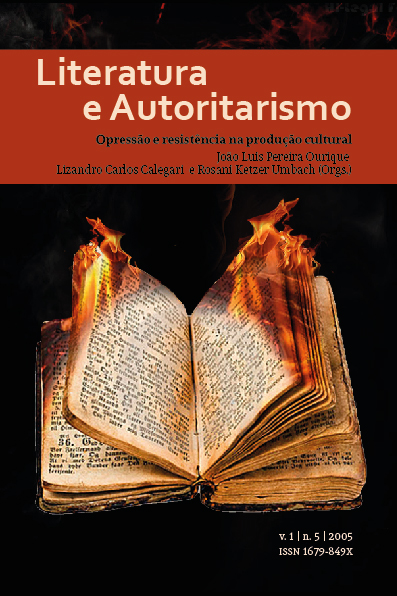Adorno and the negative utopia of cultural formation
DOI:
https://doi.org/10.5902/1679849X74036Keywords:
Adorno, Negative Utopia, Cultural trainingAbstract
Scientism put all the strength contained in cultural tradition on the defensive, putting into crisis the notions of education linked to humanism, opening a wide front for the prevalence of purely technical-scientific interests in the field of Pedagogy and teaching degrees. To remove the theme from the theoretical imprisonment to which it was subjected, I intend, in this article, to use some contributions from semiotics, through the definition of image (from cultural formation) allied to the notion of sign, and from hermeneutics, emphasizing the historicity of understanding. To the extent that semiotics allows the reading of the image as an entity independent of the referent itself, then another configuration of the discussion on the topic of cultural formation can be established.
Downloads
References
ADORNO, Theodor. Anotações sobre Kafka. Prismas. Crítica cultural e sociedade. Trad. Augustin Wernet e Jorge Mattos Brito de Almeida. São Paulo: Ática, 1998.
ADORNO, Theodor. Dialética negativa. Madrid: Taurus, 1986.
ADORNO, Theodor. Educação e emancipação. Rio de Janeiro: Paz e Terra, 1995.
ADORNO, Theodor; HORKHEIMER, M. Dialética do esclarecimento: fragmentos filosóficos. Rio de Janeiro: Zahar, 1985.
ADORNO, Theodor. Teoria da semicultura. In: Educação & sociedade. Revista de Ciência da Educação. Campinas - SP: Papirus, 1996. ano XVII.
ADORNO, Theodor. Teoria estética. São Paulo: Martins Fontes, 1988.
APEL, Karl-Otto. Transformação da filosofia II. O a priori da comunidade de comunicação. São Paulo: Ed. Loyola, 2000.
FELMAN, Shoshana. Educação e crise, ou as vicissitudes do ensinar. NESTROVSKI, Arthur A.; SELIGMANN-SILVA, Márcio et aI. Catástrofe e representação. São Paulo: Escuta, 2000.
GADAMER, H.-G. Verdad y método. Fundamentos de una hennenéutica filosófica.Vol. I. 6. ed. Salamanca: Sígueme, 1996.
HABERMAS, J. Modernidade – um projeto inacabado. In: ARANTES, Otília B. Fiori; ARANTES, Paulo E. Um ponto cego no projeto moderno de Jürgen Habermas. São Paulo: Brasiliense, 1992, c 1981.
HABERMAS, J. Teoría de Ia acción comunicativa. vol. I, Racionalidad de Ia acción y racionalización social. Madrid: Taurus, 1987a.
HABERMAS, J. Teoria de Ia acción comunicativa. vol. II, Critica de Ia razón funcionalista. Madrid: Taurus, 1987b.
JAMESON, Fredric. Pós-modernismo. A lógica cultural do capitalismo tardio. Trad. Maria Lisa Cevasco. 2. ed. São Paulo: Ática, 2000.
LARA, Maria Pía. Albrecht Wellmer y ellegado de Ia teoria critica. (prólogo). In: WELLMER, Albrecht. Ética y diálogo: elementos deljuicio moral en Kant y en Ia ética deI discurso. Traducción de Fabio Morales. Barcelona: Anthropos; México: Universidad Autônoma Metropolitana - Iztapalapa., 1994.
LYOTARD, Jean-François. O pós-moderno. Trad. Ricardo Correia Barbosa. 3. ed. Rio de Janeiro: José Olympio, 1988.
MARCONDES, Danilo. A crise de paradigmas e o surgimento da modernidade. In: ZAIA, Brandão (Org.). A crise de paradigmas e a educação. São Paulo: Cortez, 1994. (Questões da nossa época). v. 35.
MARRAMAO, Giacomo. Poder e secularização. As categorias do tempo. Tradução de Guilhenne Alberto Gomes de Andrade. São Paulo: Editora da Universidade Estadual Paulista, 1995. (Biblioteca básica).
PINTO, Julio. 1, 2, 3 da semiótica. Belo Horizonte: UFMG, 1995.
WELLMER, Albrecht. Sobre Ia dialéctica da Ia modernidad y Ia posmodernidad. La critica de Ia razon después de Adorno. Madrid: Visor, 1993.
Downloads
Published
How to Cite
Issue
Section
License
DECLARAÇÃO DE ORIGINALIDADE E EXCLUSIVIDADE E CESSÃO DE DIREITOS AUTORAIS
Declaro que o presente artigo é original e não foi submetido à publicação em qualquer outro periódico nacional ou internacional, quer seja em parte ou na íntegra. Declaro, ainda, que após publicado pela Literatura e Autoritarismo, ele jamais será submetido a outro periódico. Também tenho ciência que a submissão dos originais à Literatura e Autoritarismo implica transferência dos direitos autorais da publicação digital. A não observância desse compromisso submeterá o infrator a sanções e penas previstas na Lei de Proteção de Direitos Autorais (nº 9610, de 19/02/98).






